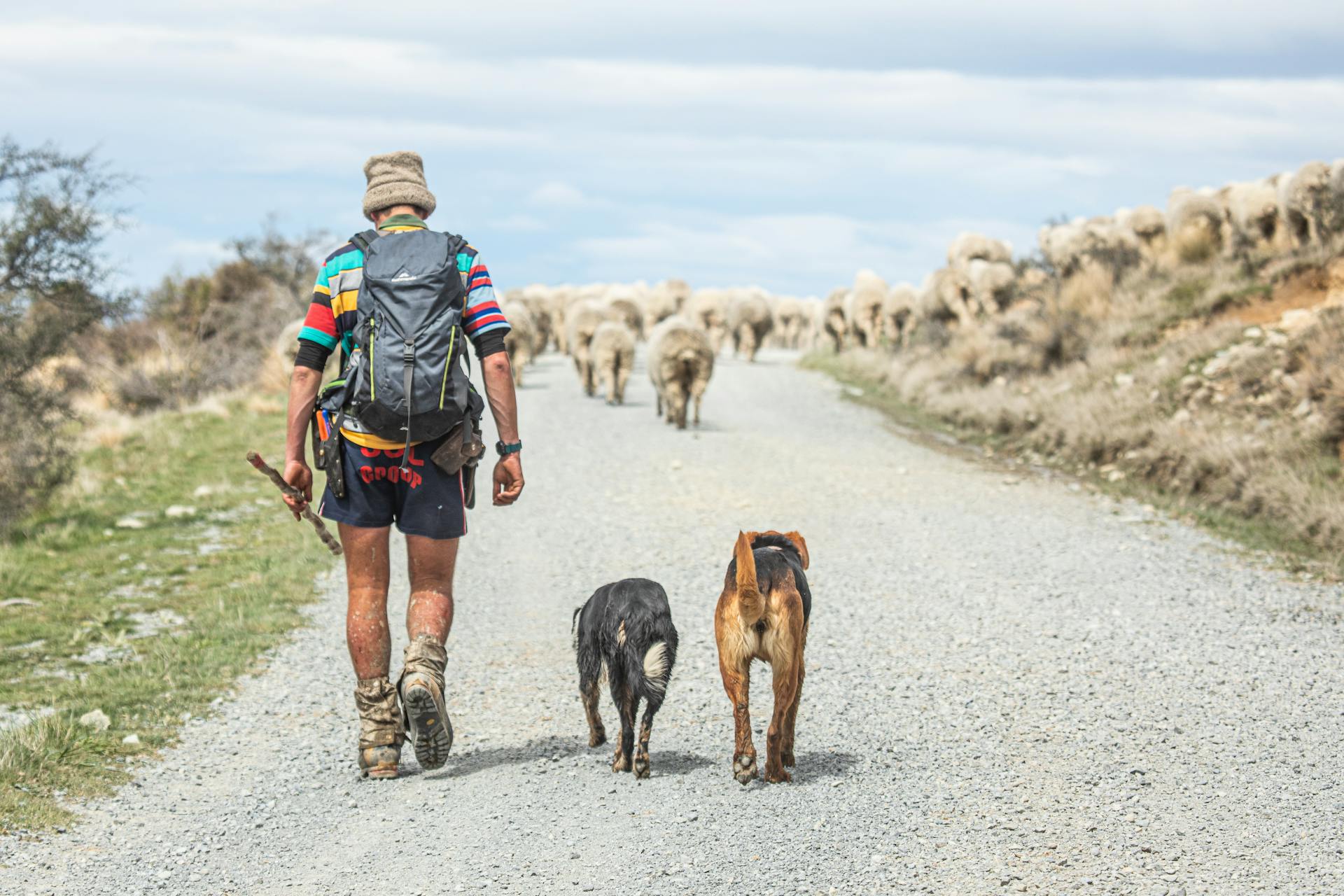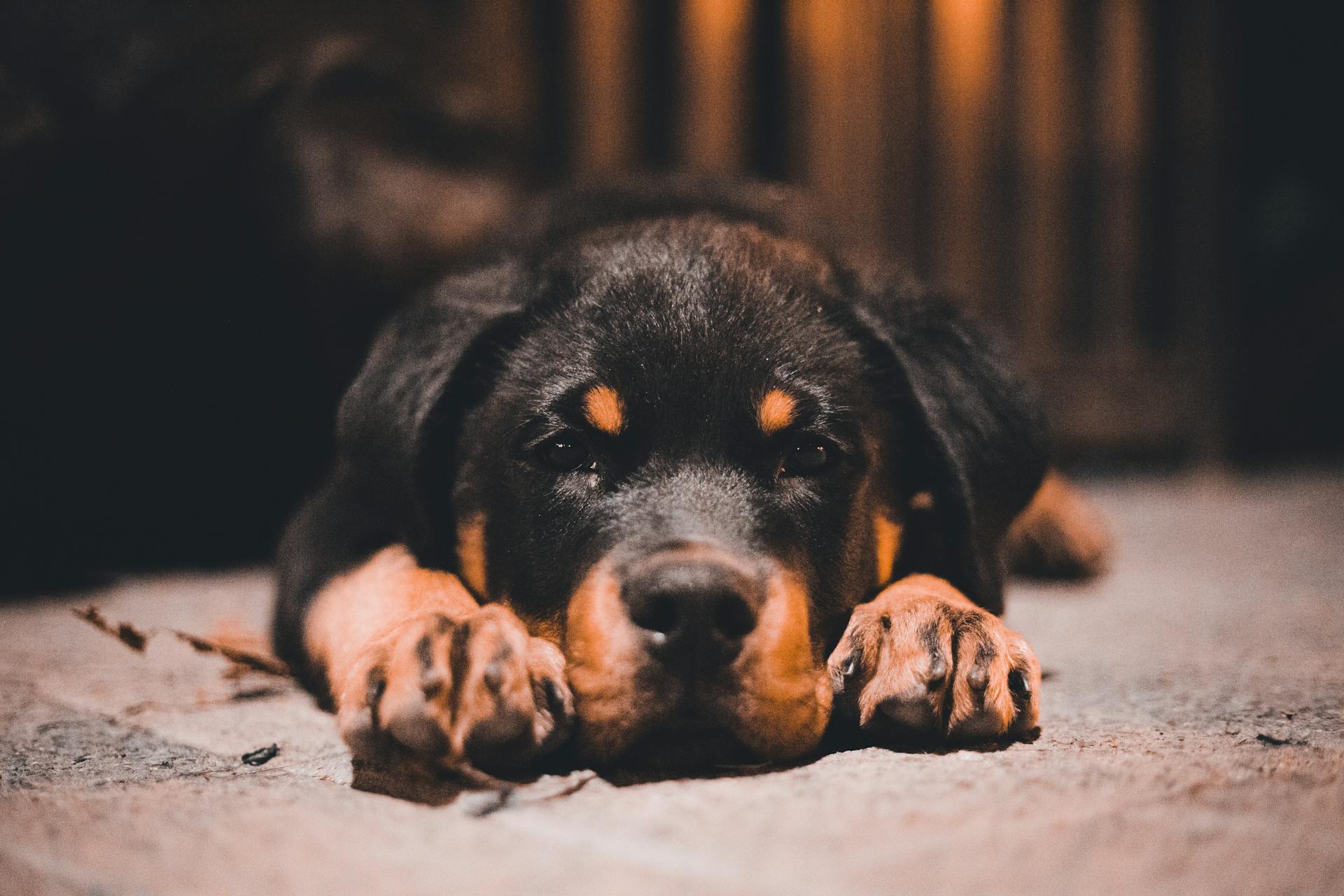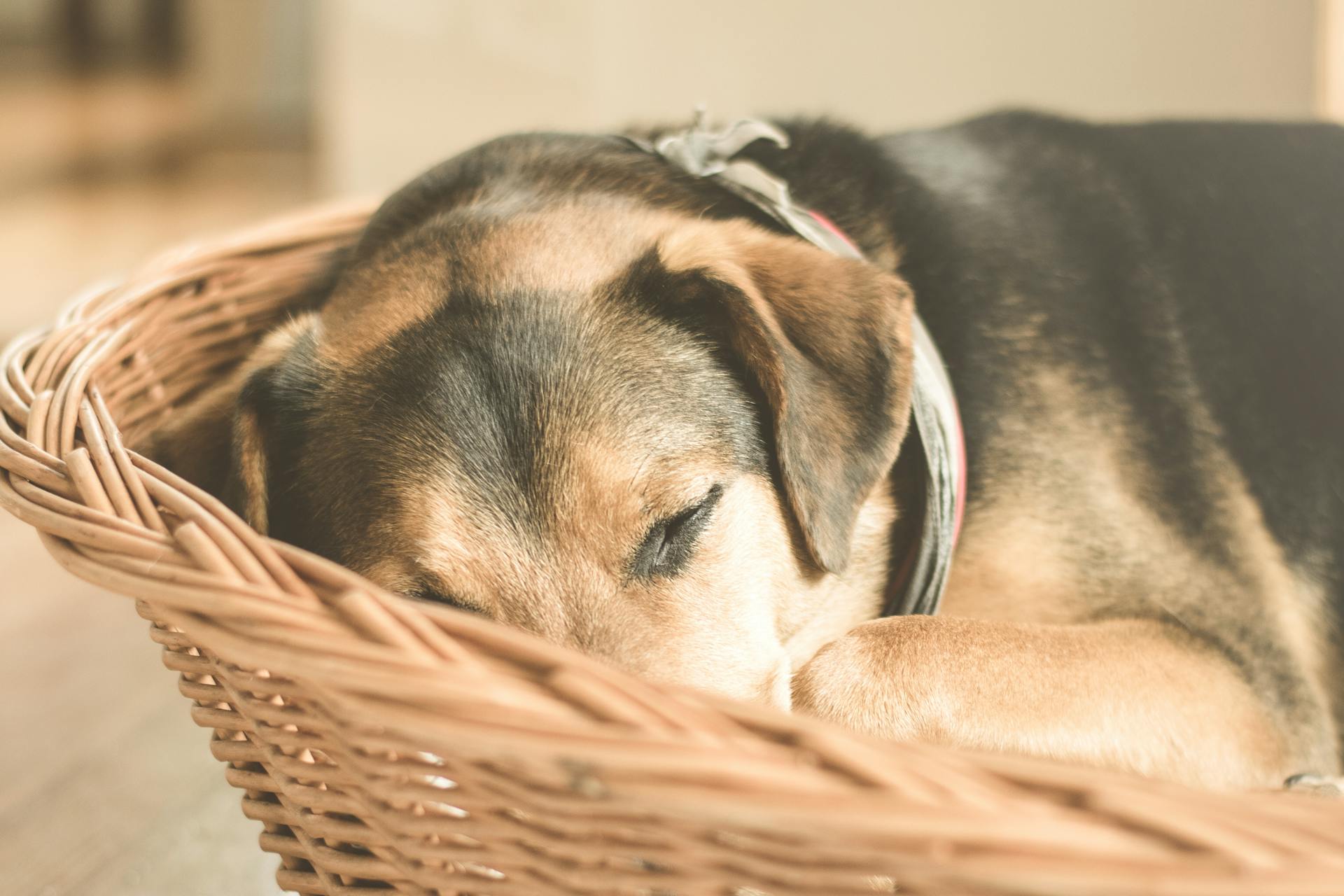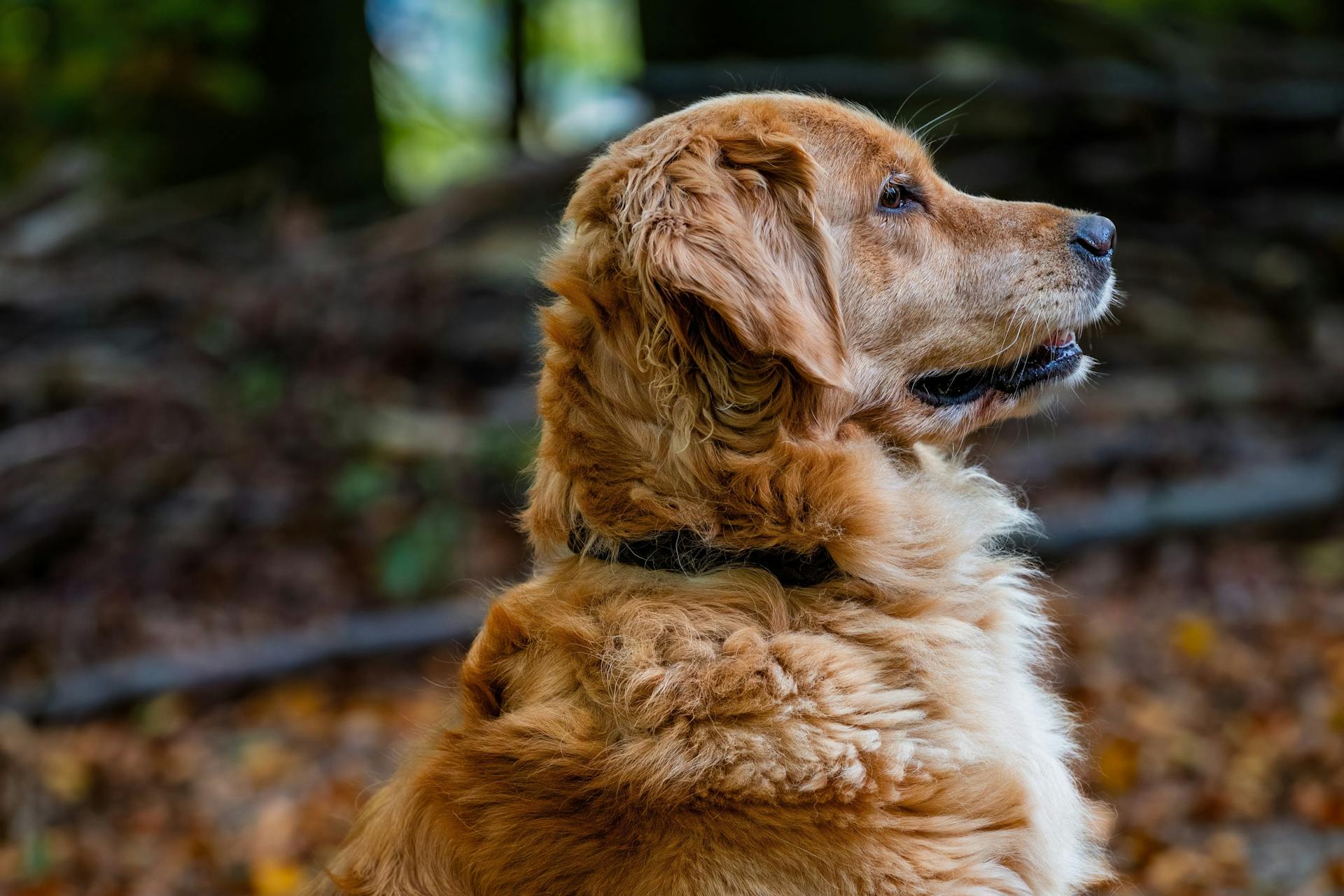
Golden Retrievers are a popular choice for families due to their friendly and gentle nature. They are also great with children, making them an excellent addition to any family.
One of the most notable characteristics of Golden Retrievers is their intelligence. They are highly trainable and can learn a wide range of commands and tasks with ease.
Breed Characteristics
The Golden Retriever is a breed that's known for its sweet and calm nature, making it a great companion for many families.
They're hard-wired with a good disposition, but like all dogs, they need to be well-raised and well-trained to reach their full potential.
Early socialization is crucial for Golden Retrievers, exposing them to many different people, sights, sounds, and experiences when they're young helps ensure they grow into well-rounded dogs.
Size
Golden Retrievers are large dogs, with males reaching a height of 23 to 24 inches and weighing 65 to 75 pounds.
Males typically reach their full height by one year of age, and their mature weight by two. Females are slightly smaller, standing at 21.5 to 22.5 inches and weighing 55 to 65 pounds.
The AKC Breed Standard sets the ideal height for males at 23 to 24 inches, measured at the shoulder, and the weight from 65 – 75 pounds. Females should be 21½ to 22½ inches and weigh 55 – 65 pounds.
Size that is significantly larger or smaller than the Standard may be an indication that the breeder does not prioritize following the GRCA Code of Ethics. This raises concerns about other aspects of the breeding, such as health and temperament issues.
Personality
The Golden Retriever's personality is a key part of what makes them such wonderful companions. A sweet, calm nature is the hallmark of the breed.
They're bred to work with people and are eager to please their owners, which makes them highly trainable. This eagerness to please means they thrive on positive reinforcement and clear communication.
Socialization is crucial for Golden Retrievers, as it helps ensure they grow into well-rounded dogs. Early exposure to many different people, sights, sounds, and experiences is essential for their development.
With proper socialization and training, Golden Retrievers can become confident and calm companions, perfect for families and individuals alike.
Health and Care
Golden Retrievers are naturally "mouthy", and they're happiest when they have something to carry in their mouths.
Tiring your Golden out with 20-30 minutes of vigorous exercise twice daily will keep your dog mellow when he's back inside. Slacking on the activity, however, could lead to behavior problems.
Don't let your Golden puppy run and play on very hard surfaces such as pavement until he's at least two years old and his joints are fully formed.
Health
Health is a top priority for everyone, and taking care of our physical and mental well-being is crucial. Proper nutrition is essential for a healthy lifestyle, and the article highlights the importance of a balanced diet rich in fruits, vegetables, whole grains, and lean proteins.
Eating a variety of colorful fruits and vegetables can help reduce the risk of chronic diseases like heart disease and diabetes. In fact, a study mentioned in the article found that a diet high in fruits and vegetables can lower blood pressure and cholesterol levels.
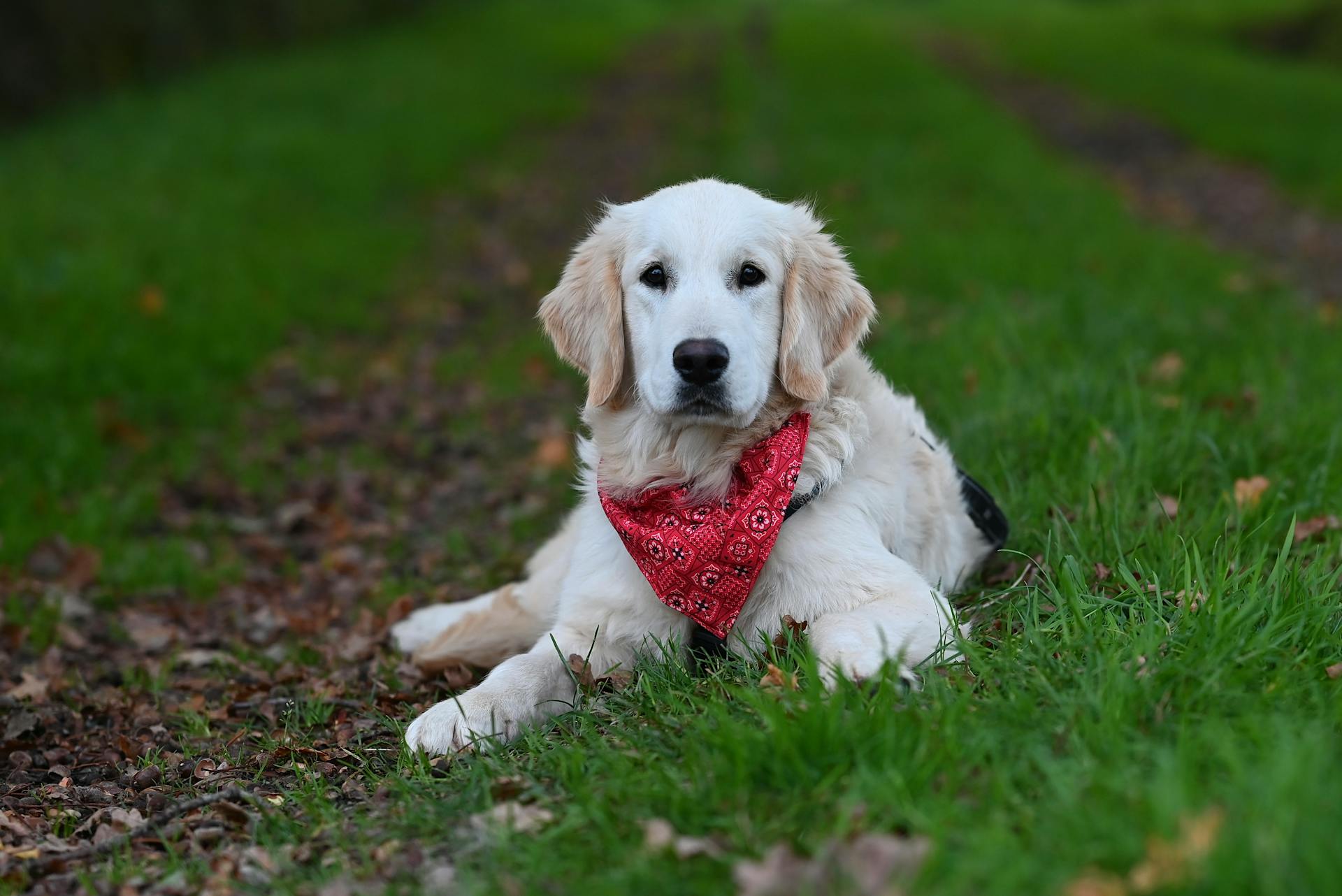
Regular exercise is also vital for maintaining a healthy weight and reducing the risk of chronic diseases. The article notes that even small amounts of physical activity, such as taking a short walk each day, can have significant health benefits.
Getting enough sleep is also crucial for our overall health and well-being. The article suggests that adults aim for 7-9 hours of sleep each night to help regulate their metabolism, build strong bones, and support immune function.
Taking care of our mental health is just as important as our physical health. The article highlights the importance of practicing stress-reducing techniques, such as meditation and deep breathing, to help manage anxiety and depression.
Care
Golden Retrievers are built for action and love outdoor romps, so they need at least 20-30 minutes of vigorous exercise twice daily to stay happy and mellow.
Exercise should be a priority, especially for Golden Retriever puppies, who grow rapidly between four and seven months and are susceptible to bone disorders if they jump and play on hard surfaces too early.
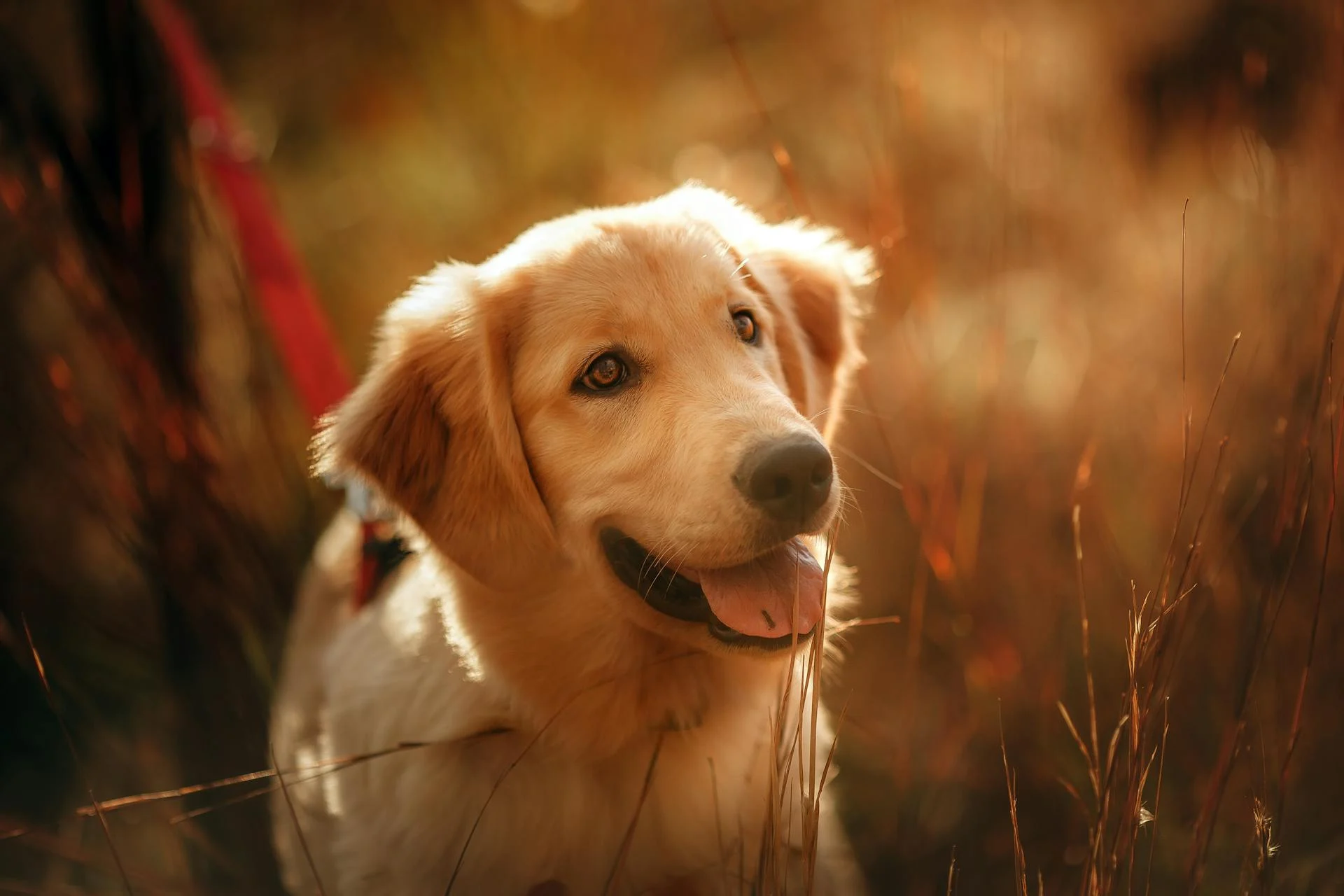
Puppies need to be crated or confined when left unsupervised, whether it's at night, when you're away from home, or while you're preoccupied with another task.
Crating or confinement can't be the entire daily routine, though - puppies need to be tired after exercise, have had some social interaction, and have empty bowels and bladders to nap comfortably for 1-4 hours.
If you're away from home for more than half a day, consider doggie day care or hiring a dog walker, especially for young puppies.
Feeding
Feeding your Golden Retriever is crucial for their overall health and well-being.
The recommended daily amount of food is 2 to 3 cups of high-quality dry food a day, divided into two meals.
Dogs, just like people, are individuals and their feeding needs can vary greatly depending on their size, age, build, metabolism, and activity level.
A highly active dog will need more food than a couch potato dog, and the quality of dog food makes a big difference as well.
Readers also liked: What Is the Best Large Breed Dog Food
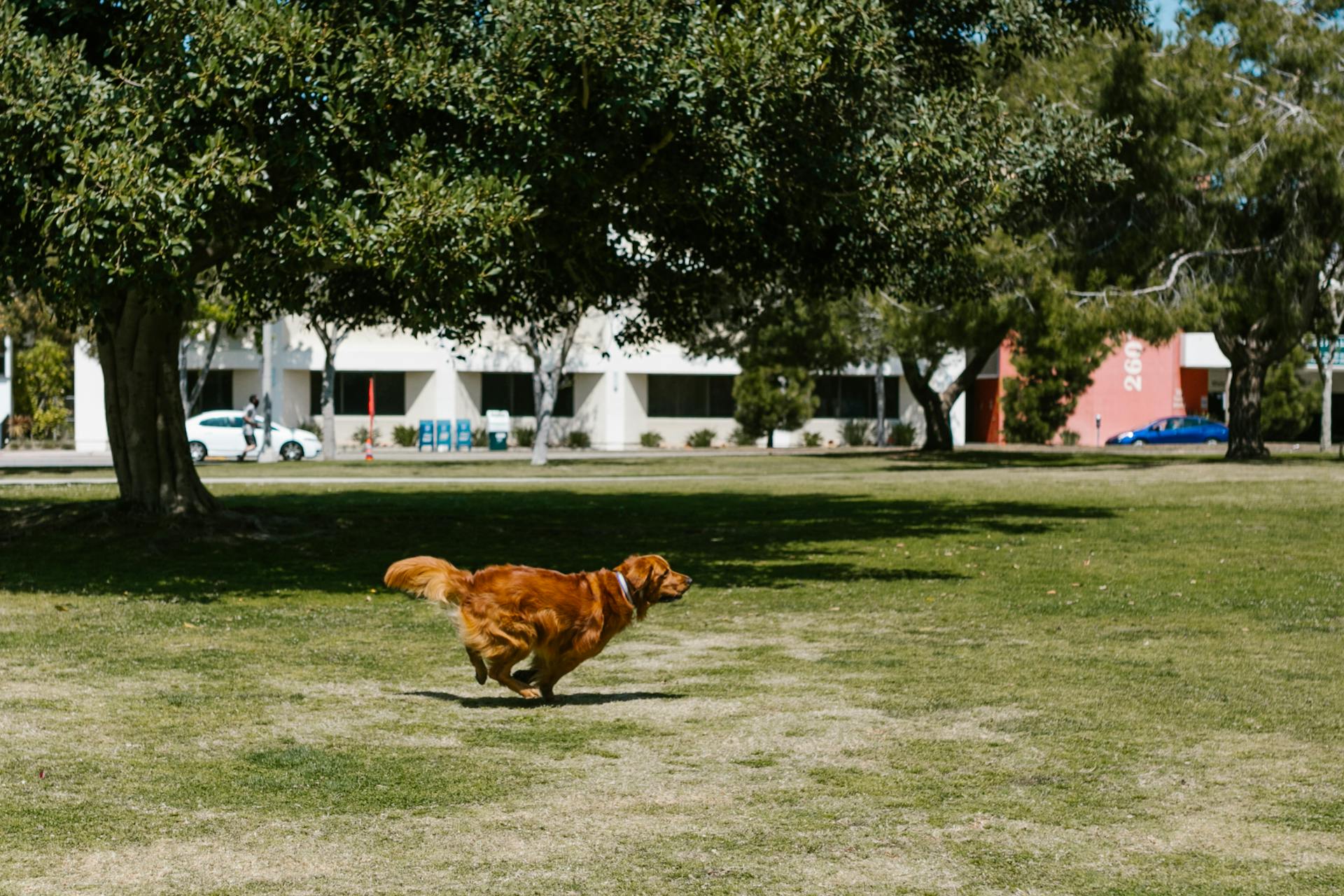
To keep your Golden in good shape, it's essential to measure their food and feed them twice a day rather than leaving food out all the time.
If you're unsure whether your Golden is overweight, give them the eye test and the hands-on test.
You should be able to see a waist when looking down at them, and with your hands on their back, you should be able to feel but not see their ribs without having to press hard.
If you can't see or feel their ribs, they need less food and more exercise.
Explore further: Royal Canin Golden Retriever Dog Food
Shedding and Grooming
Golden Retrievers shed, and it's essential to be prepared for the amount of dog hair that will end up in your house and on your clothes.
Major shedding cycles generally occur about once per year, but there's also some minor coat loss all year long.
Daily brushing is almost mandatory during major sheds, but weekly brushing is sufficient for most of the year.
Baths are particularly helpful to loosen dead coat so that it can be brushed out before it falls out around the house.
Goldens can be bathed as frequently as the owner desires, and clean, dry skin and ears help keep the skin and ears healthy.
Nonetheless, despite regular grooming and increased vacuuming, there will still be Golden fur on the floor, perhaps on the furniture, and maybe even in the soup!
It's worth noting that even with regular grooming, some Goldens may aggravate an individual's allergies more than others.
For more insights, see: Golden Retriever Dog Grooming
Exercise and Training
Exercise is crucial for Goldens, especially during puppyhood when they have boundless energy and need regular outlets to burn it off. A physically tired puppy is a well-behaved puppy!
Puppies and adolescents need brisk walks on lead, swimming, and play dates with known safe dogs to keep them active. Chasing a ball in a safe enclosure is also a great way to tire them out. But remember, jogging and biking with a young Golden's developing joints can be too stressful.
As adults, Goldens still require regular, vigorous activity to maintain lean body weight and promote physical and mental fitness. A fenced yard can be a convenient and safe place for them to run and play, but it's not a substitute for regular exercise.
Goldens are not self-exercisers, so they need their people to accompany them on walks and playtime. A fenced yard won't meet their exercise needs, and electronic fences can be breached by determined or bored dogs.
Socialization and training are just as important as exercise for Goldens. They mature mentally and physically at a rate that corresponds to one month of a puppy's life equal to one year of a child's life, for the first 24 months. This means that 2-4 months of age is a critical developmental period for a puppy.
During this time, socialization should include frequent exposure to all the situations a Golden may encounter as an adult, such as car rides, visitors, and loud noises. Puppy training classes can also be a useful part of this process, teaching owners how to effectively interact with and train their puppies.
Intriguing read: Dog Life Jacket Golden Retriever
Living with a Golden Retriever
Living with a Golden Retriever can be a joyous experience, as they are known to be friendly and loyal companions. They thrive on human interaction and attention, so be prepared to spend quality time with your furry friend.
Golden Retrievers are highly energetic dogs, requiring regular exercise to stay happy and healthy. A daily walk of at least 30 minutes is essential to keep them physically and mentally stimulated.
Their thick double coat requires regular grooming, with brushing sessions lasting around 10-15 minutes, 2-3 times a week. This will help prevent matting and tangling, keeping their coat healthy and shiny.
Golden Retrievers are prone to certain health issues, such as hip dysplasia and eye problems, so it's essential to work with a reputable breeder who prioritizes health testing and genetic diversity.
They are highly intelligent dogs, responding well to positive reinforcement training and consistency. With patience and practice, you can teach your Golden Retriever to obey basic commands and even learn some fun tricks.
Related reading: Why Is My Dog's Chest so Big?
Quick Facts
Golden Retrievers are a popular breed, and for good reason! They're known for their friendly, intelligent, and devoted nature, making them excellent family pets and service dogs.
Their size is moderate to large, with females weighing 55-75 pounds and males weighing 65-75 pounds.
Golden Retrievers have a dense, water-repellent double coat that's usually golden in color, but can have different shades of gold, from pale to dark.
Their lifespan is around 10-12 years, which is a good amount of time to enjoy their company.
Here are some key stats about Golden Retrievers at a glance:
Golden Retrievers are highly trainable and eager to please, which makes them excel in obedience and various activities like agility and therapy work.
Their coat requires regular brushing to prevent matting, especially during shedding seasons, when they shed moderately year-round and more heavily.
Frequently Asked Questions
Is a Golden Retriever considered a large dog?
While Golden Retrievers are often considered a large breed, their size falls between medium and large, with males weighing 65-75 pounds and standing 23-24 inches tall. They are not typically considered a giant breed, but rather a sturdy and athletic medium to large-sized dog.
What dog looks like a Golden Retriever but bigger?
The Leonberger is a larger dog that resembles a Golden Retriever in appearance, with a similar sweet face and double coat. If you're looking for a bigger version of the Golden Retriever, the Leonberger is worth considering.
Sources
- https://es.ambientlounge.eu/blogs/news/golden-retrievers
- https://www.monsterk9.com/blogs/large-dog-blog/large-breed-spotlight-all-about-golden-retrievers
- https://dogtime.com/dog-breeds/golden-retriever
- https://www.newsweek.com/golden-retriever-loves-big-dog-viral-video-1881688
- https://grca.org/find-a-golden/begin-the-search/is-a-golden-retriever-right-for-you/
Featured Images: pexels.com
